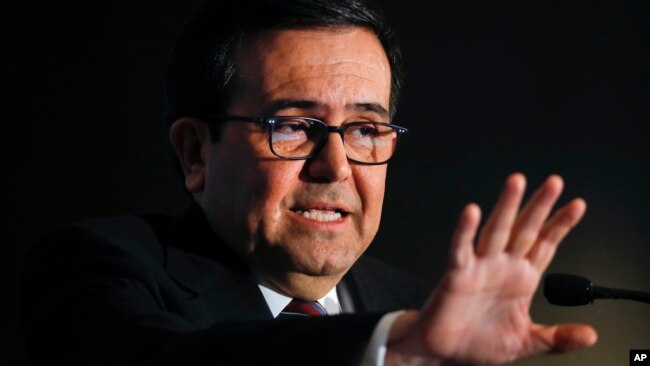- Joined
- Dec 6, 2010
- Messages
- 33,423
- Reaction score
- 5,684
Mexico Takes First Step Before Talks With U.S. on NAFTA
By ELISABETH MALKIN
FEB. 1, 2017

By ELISABETH MALKIN
FEB. 1, 2017

MEXICO CITY — The Mexican government said on Wednesday that it was beginning a 90-day consultation with the country’s Senate and private sector before talks with the United States to review the North American Free Trade Agreement.
President Trump has said he wants to renegotiate Nafta to obtain a better deal for the United States, calling the accord the “single worst trade deal ever approved in this country.” He has threatened to pull the United States out of Nafta, which includes Mexico and Canada, if he cannot negotiate more favorable terms.
Tensions have been escalating between the United States and Mexico since Mr. Trump’s election, and last week, President Enrique Peña Nieto of Mexico canceled a trip to Washington after Mr. Trump again insisted on Twitter that Mexico pay for a border wall. But Mexico has pressed to establish a dialogue with the new administration in Washington.
And on Wednesday night, the Mexican government denied an Associated Press report that quoted Mr. Trump, in an excerpt from a phone call last Friday, as warning Mr. Peña Nieto that he would send United States troops to Mexico to stop “bad hombres down there” if Mexico’s security forces failed to do so.
Under the United States’ Trade Promotion Authority laws, the White House must inform Congress at least 90 days before any new trade agreement is signed. While it was not immediately clear whether the Trump administration gave notice to Congress on Wednesday, the Mexican government plans to go through a similar process, according to a statement from Mexico’s foreign and economy ministries. Negotiations are expected to begin in May.
The possibility of any talks at all seemed remote last Thursday when Mr. Peña Nieto canceled his trip.
He has said repeatedly that Mexico will not pay for the wall, which Mr. Trump made the centerpiece of his presidential campaign, despite a projected cost of billions of dollars and questions raised by his secretary of homeland security, John F. Kelly, over how effective it would be.
The phone call between Mr. Trump and Mr. Peña Nieto was presented as having improved relations somewhat, though there was no agreement on the wall or on whether Mr. Peña Nieto’s trip would be rescheduled.
Mexico’s foreign minister, Luis Videgaray, said that talks with White House officials had continued after the call, leading to Wednesday’s announcement.
Mexico has argued that any renegotiation of Nafta must be accompanied by talks over the range of issues that link the two countries, especially border security and immigration. “The message is that we want to have a good integral relationship in all areas,” Mr. Videgaray said.
Nafta is almost a quarter of a century old, and in that time, it has turned Mexico into a manufacturing powerhouse that ships cars, appliances, electronics, medical equipment and produce north of the border.
But investment by American companies in Mexico, as they shut down factories at home, has made Nafta the focus of searing arguments against free trade.
Job losses in American manufacturing have different causes, and not all industries in the United States have suffered. Last month, some 130 agricultural organizations sent a letter to Mr. Trump stating that “increased market access under Nafta has been a windfall for U.S. farmers, ranchers and food processors.”
While the Mexican government is intent on preserving Nafta and the $1.4 billion in two-way trade that crosses the border every day, uncertainty over the agreement’s fate has led to pressure on the Mexican peso and worries that companies will delay investment.
In response, the Mexican government is working to seal agreements with other partners. It is updating its accord with the European Union and looking at bilateral deals with countries like Argentina, Australia and Brazil.
“We want to reach an agreement,” Mr. Videgaray said, referring to Nafta, “but we have to be prepared for all scenarios.”
https://www.nytimes.com/2017/02/01/world/americas/mexico-nafta-renegotiation-trump-wall.html
Last edited:






